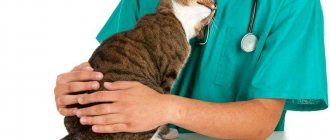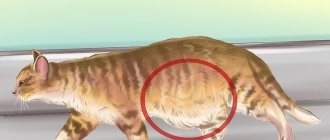11494Pavel
It is often very difficult to determine that a pet has become infected with worms. Owners learn about this disease only after the cat has vomited worms. Some people think that if an animal vomits worms, then they are gone, but, as a rule, this is a mistaken opinion.
If your pet vomits worms, then this is an alarming sign, which means that:
- he became infected with parasites;
- There are a lot of worms in the animal’s body that can vomit.
Therefore, it is worth starting treatment immediately, otherwise it can even lead to the death of the animal.
The cat vomited worms: 5 reasons
The infestation of animals by parasites is the rule rather than the exception. Pets that do not walk outside are also not immune from helminthiases. Worm eggs and larvae are everywhere: in the ground, crowded places, tap water, food.
Upon contact with outer clothing, shoes, or water, roundworms and nematodes enter the body.
Vomiting of worms is a consequence of a number of reasons:
- Severe worminess. In the absence of anthelmintic prophylaxis, helminths multiply quickly, and the body rejects the excess.
- Intestinal obstruction. An excessive number of worms creates congestion in the digestive organ, disrupting peristalsis.
- Intoxication. Nematodes and Giardia produce toxins. Vomiting is a protective reflex during poisoning; some parasites are released in the vomit.
- Damage to internal organs. Worms cause inflammatory processes in the stomach, liver, even cirrhosis. Reflexive evacuation of stomach contents is one of the symptoms of organ damage.
- Reaction to an anthelmintic drug.
Vomiting is a serious symptom that indicates a serious condition of the animal.
What are the dangers of having parasites in cats?
Cats can get 2 types of parasitic worms: tapeworms and roundworms . In addition, they can exist together and coexist perfectly. Most helminths of these groups can settle in humans. A cat infected with helminthiasis poses the greatest risks to small children, who can hardly keep a distance when interacting with the animal. That is, the presence of worms in an animal living in the house creates a high risk of infection for humans.
But not only people feel discomfort if worms appear in their body. The cat is an intelligent creature and also suffers from health problems. Worm infestation in cats can significantly ruin a pet’s life, and in the worst case, lead to death. The cause of fatality when cohabiting with parasites can be the following factors:
- Intestinal obstruction, which can be caused by a large accumulation of worms.
- Poisoning by helminth waste products.
- Exhaustion of the body due to a deficiency of vital substances. Especially in combination with other animal diseases.
Kittens suffering from helminthic infestation may be stunted in growth and development. When a growing body is poisoned by toxic waste products of worms, it does not receive enough necessary nutrients and vitamins. A kitten may even die from a large number of parasites.
How do worms come out through vomiting?
The animal's immune system is able to independently resist parasites. Poor nutrition, care, and chronic diseases undermine the defense system, and worms actively multiply.
Once inside, the worms cling to the intestinal microvilli and feed on the juice produced to digest food. A lack of digestive juice disrupts the food processing process. Peristalsis is disrupted, congestion forms, which the kitten’s body tries to get rid of by vomiting. Nematodes and roundworms live mainly in the intestines and come out with the contents of the intestines.
Be sure to read:
When to worm kittens for the first time: for what, at what age is it better, how to properly, the best preparations.
Worm larvae migrate through the intestines into the intrahepatic bile ducts. The secretory function of the liver is impaired. Excess bile enters the blood, cholemia develops, accompanied by vomiting.
Regardless of the type, parasites in the acute phase cause allergies in the host. The immune system intensively produces antigen.
A high concentration of antibodies causes degenerative processes in organs where larvae and adult parasites accumulate. If the digestive system is not functioning well, the remains of undigested food have a toxic effect with manifestations of the gag reflex.
What is the reason?
Understanding on your own why a kitten is vomiting can sometimes be very difficult. However, the owner should try to find out what influenced the occurrence of such an unpleasant symptom. Vomiting is a reaction of the stomach to any irritants. There are various reasons that provoke vomiting in kittens:
All of the above reasons apply to those kittens that have already been weaned from the cat and eat food on their own. If the kitten does not yet eat adult food, but feeds on mother’s milk, then it is quite possible that along with this useful product, some harmful substances enter its body that negatively affect the gastrointestinal tract. This happens when a cat is sick and is given any medications.
The cat vomited worms: what to do
The presence of parasites in the vomit indicates an advanced form of helminthiasis. The pet must be taken to a veterinarian for examination as soon as possible. The doctor will assess the condition of the predator and, based on the test results, determine what damage has been caused to organs and systems.
The breeder tells the doctor about the pet's behavior in the previous month. A description of the symptoms will help you understand how long the predator has been sick.
Signs of infestation:
- loss of appetite: refusal to eat or, conversely, eating a lot;
- bloated stomach;
- upset stool, frequent diarrhea with a strong odor, constipation;
- decreased activity, drowsiness;
- hair loss;
- allergy symptoms: cough, watery eyes;
- irritability, avoids contact, does not give in to hands;
- rubs and licks the anus.
The doctor will prescribe treatment taking into account the presence of complications. After completing anthelmintic therapy, the doctor will explain how to use the medicine for preventive purposes.
What can cause bleeding?
The range of factors is wide. This may be an injury in the mouth, where the gums are damaged, or deep inside the gastrointestinal tract. Among the main ones are
:
. Cancerous and other formations in a cat's stomach are often accompanied by scarlet-colored vomit. However, this happens more often at critical stages of the disease, when usually the cat has already been examined by a doctor.
. A common ailment for furry pets. Timely treatment will help save the cat's life. For this, the veterinarian develops an individual medication regimen and a strict diet.
. Cats are extremely curious. If there is small plastic garbage, glasses with a specific smell, needles and other sharp objects scattered around the house, the animal can taste it, which will lead to constant vomiting. In this case, surgery cannot be avoided.
If a kitten is vomiting blood, it is probably a foreign object or congenital disease. The problem is that for an unformed organism it is a threat. Too frequent nausea leads to decreased tone and dehydration of the body.
It is easy to distinguish the symptoms of an ulcer or tumor from vomiting. When the blood is caused by a disease, brown inclusions can be observed in the fluid. In addition, stomach problems include diarrhea and general malaise of the cat.
According to statistics, an ulcer is the most common reason why a cat vomits blood. The owner’s task is to identify the disease as soon as possible in order to begin treatment. This is indicated by a number of symptoms
:
First aid
Severe symptoms may occur in the evening when veterinary clinics are closed.
The pet owner can provide first aid independently.
- The predator is given plain water (not by force). The liquid will help remove residual toxic substances and relieve spasm of the intestinal muscles.
- Refuse to feed, especially dry food. Food provokes attacks of nausea. A predator may choke on pieces of food.
- Sorbents are given to block the action of toxic substances; activated carbon (1 t/kg) or Phosphalugel (0.5-1 mg/kg) are suitable.
Be sure to read:
Pyrantel for cats: dosage, instructions for use for different forms, indications and contraindications
As soon as the pet's condition improves, it is taken to the veterinarian.
What to do and how to help your pet?
When a cat vomits a white worm, you should not immediately grab it and go to the veterinary clinic. Such sudden movements can lead to the pet simply choking on vomit. You should contact a specialist only after the worm has already come out and the animal no longer regurgitates. After this, you need to collect the vomit along with helminths in a jar or sealed bag. This will make it easier for the veterinarian to determine the source that is causing the cat to vomit, as well as select the necessary medications. Vomit does not pose a danger to humans, but you should still carefully collect its remains. At the same time, they follow the rules of hygiene, perform the manipulation with medical gloves and treat the dirty area with chlorine bleach or a disinfectant.
First aid
To rid your pet of parasites, you need to try to give him medicine against them.
When a cat burps white worms, and the owner is unable to take it to a veterinary clinic, then it is possible to help the pet on your own. If the animal is sick and vomits, then it is necessary to give liquid to reduce the irritant effect on the esophageal mucosa and wash away digestive juices. The following steps can also be taken at home to help a cat with parasite vomiting:
- Give your pet anti-worm tablets, as well as activated charcoal. In this way, it is possible to prevent the spread of helminthic toxic substances throughout the cat’s body.
- In the first few hours after vomiting, do not feed the cat, as it may again vomit worms.
Drug treatment
Vomiting with worms requires urgent contact with a veterinarian, who will examine the cat and select the necessary therapeutic actions. If your pet vomits once and thin worms come out, then an anthelmintic drug is prescribed, which fights specifically against a specific type of parasite. When a pet vomits and a white worm or other helminths are detected in the masses, the following medications are prescribed, indicated in the table.
| Group | Medicines |
| Anthelmintics | "Pirantel" |
| "Drontal" | |
| "Parasicil" | |
| "Kanikvantel" | |
| "Stronghold" | |
| "Profender" | |
| Drugs that eliminate intoxication and replenish water balance | Glucose for intravenous administration |
| Ringer's solution |
To stabilize the digestive function of a pet after prolonged vomiting, it is necessary to drink probiotics.
If this phenomenon does not recur, then the animal can be given regular food only after 3 days.
After a cat has vomited a long white worm, it is necessary not only to treat it with medications, but also to monitor its diet. It is important to refuse to eat any food on the first day to prevent your pet from vomiting again. If within 24 hours the cat no longer burps and its condition is satisfactory, then you can give chicken broth or porridge with a liquid consistency. They return to their normal diet no earlier than 3 days after vomiting.
Folk recipes
When a cat regurgitates worms or has severe vomiting, you can use unconventional therapeutic measures, which are previously discussed with a veterinarian. After your pet has vomited, it is recommended to make pumpkin puree. This dish helps stabilize digestive function and alleviate the cat’s condition. This food is fed for 1 tsp. twice a day for 3 days.
It is equally effective to use a decoction of oak bark after vomiting worms. Due to the tanning properties of the main component, the absorption function of the intestine is reduced, which is why fewer toxic substances enter the bloodstream. Tea leaves have the same effect on a cat after vomiting. It needs to be consumed orally, 1 tsp. per day. If the cat is rapidly getting worse, and vomiting interspersed with worms becomes more frequent, then you should not engage in self-treatment, since this can only harm the animal.
Drug treatment
Veterinary pharmacies offer a variety of anthelmintic drugs. For severe infestations, treatment is prescribed by a doctor. He selects a remedy based on the disease, clinical picture, and condition of the cat.
Medicines differ in dosage form and methods of administration.
The dosage and treatment regimen are determined by the veterinarian and, if ineffective, adjusted.
| name of the drug | dosage form | dosage | contraindications |
| Drontal | pills | tablet per 4 kg of cat's weight | age up to 21 days, weight less than kg |
| Kanikquantel Plus | tab. | 1/10 kg | up to 3 weeks, pregnancy |
| Milbemax | tab. | 0.5 tab./kg | up to six months, less than 0.5 kg |
| Prazitel | suspension | 1 ml/kg | pregnancy |
| Prazicide | susp. | ml/kg | less than 3 weeks |
| Prasimek-S | pills | 2/2.5 kg | up to 2.5 months, |
| Helmintal K | drops | 0.1 ml/kg | – |
Drops are applied to the skin, in places inaccessible to licking. For kittens and pregnant females, therapy is carried out carefully. If health deteriorates, discontinue the drug and contact a veterinarian.
How to recognize the symptoms of infection?
As mentioned above, there are certain symptoms of infection; every pet owner needs to understand how to tell if a cat has worms. By the way, doing this is actually very simple.
First of all, the presence of symptoms depends on how long the parasites have been localized in the animal’s body, as well as on their species.
For example, if we are talking about cystodes, then the animal may suddenly lose its appetite and its fur may become dull. Vomiting often occurs, with blood mixed in. There may also be diarrhea or, conversely, constipation. Convulsions or anemia are possible, but, of course, only if the animal has been suffering from this infection for a long period.
Cats with worms vomit
The next type of helminths manifests itself a little differently. We are talking about dipylidiasis. Most often, vomiting, diarrhea or rumbling in the stomach appear.
We must not forget about one more type - alveococcosis. These worms appear in the intestines and are very small in size. The most dangerous thing is that they practically do not manifest themselves in any way, but at the same time they are deadly to humans.
All of the above worms that appear in cats have certain symptoms, as well as external features, in addition, there are a lot of photos of them on the Internet, so they are easy to detect if you take a closer look at the behavior of your pet, accordingly, you can contact a veterinarian in time and prescribe the correct one. treatment.
Traditional methods of treatment
Only anthelmintic drugs can cure severe forms of parasitic infestations. But folk recipes will help speed up the healing process. The use of alternative methods is agreed with the doctor.
Medicines used to treat humans can also be given to four-legged animals, only in a smaller dosage.
Home Recipes:
- Garlic. The peeled clove is crushed and added to canned food; you need to make sure that your furry friend has eaten the “medicine”. The procedure is repeated every other day.
- Onion water. Cut the onion into 4 parts with a glass of warm water. The infusion is given to the pet in the morning on an empty stomach for a week.
- Tansy. Pour boiling water (200 ml) over a tablespoon of dried flowers and leave for an hour. The strained infusion is given three times a day (as much as you drink) 30 minutes before meals.
- Fennel decoction. Dill seeds are poured with a glass of water and put on fire. After boiling, cook for 5 minutes, cool and strain. The decoction is poured into the mouth using a spoon or syringe.
Be sure to read:
How many days before vaccination should a cat be given anthelmintic: why, how to do it correctly, the best remedies
During therapy, the condition of the furry friend is monitored.
Prevention of helminthiasis
Prazitel is one of the most effective drugs against worms.
An adult animal is given prophylaxis 2 to 4 times a year. Provided that anthelmintic drugs are used two weeks before mating or scheduled vaccination. The first prophylaxis for kittens is carried out no earlier than 3 weeks after birth. Just like in adults, anthelmintic drugs must be given 14 days before vaccination. Secondary prophylaxis is carried out at 6-8 weeks, the next two times with an interval of three months, and upon reaching six months, the same as for adult cats, from 2 to 4 times a year.
What are worms?
What types of worms are most common in cats?
Long and flat, tapeworms reach a length of 10-70 centimeters, and their body consists of numerous segments. Infection causes vomiting and weight loss. Cats become infected with tapeworms by eating an intermediate host, such as infected fleas or rodents. In an infected cat, you can often see segments (worm segments) that resemble grains of rice in the fur around the anus.
How can a cat become infected with worms?
Although the methods of infection vary, one of the main methods is through eating the feces of infected animals. Cats can also pass worms to their kittens through their milk. A cat can also become infected with worms through raw meat, fish, other animals and humans. In addition, many cats love to hunt flies, and flies are carriers of worm larvae.
What are the common symptoms of worm infestation?
- Diarrhea;
- Worms. which can be seen in the stool, or worm segments near the cat’s anus;
- Bloody stool;
- Severely swollen and round belly;
- Weight loss;
- Vomit;
- Constipation;
- Cough;
- Labored breathing.
- Keep your cat indoors or in an apartment and do not let it roam outside to avoid contact with infected cats, rodents, fleas and feces.
- Make sure your home, yard (if you live in a private home) and pets are free of fleas.
- Maintain good personal hygiene and wear gloves when cleaning the cat litter box. It is also important to clean up your cat's stool frequently.
- Ask your veterinarian to recommend a good medication to prevent infestation. Cats need to be dewormed twice a year, even if your pet does not go outside. Also, deworming must be carried out before vaccinations (to avoid complications). If there are several animals in the house, everyone should be given the deworming drug at the same time. To get rid of worms, you need to give the drug twice with an interval of 10 days. Now there are a large number of domestic and foreign drugs for the treatment of helminthiasis (for example, Dirofen, Drontal, Febtal, Panacur, Pirantel, Polyvercan). They can be in tablets or in the form of a sweet suspension and are sold in all pet stores. Do not buy drugs in markets or stalls if you do not want to buy a fake. These drugs are available for kittens and adult cats, so be careful, as an overdose of anthelmintic drugs in kittens is unacceptable! Keep in mind that almost all anthelmintic drugs are toxic, but especially those that are applied to the withers. An example of an anthelmintic drug in a tube applied to the withers is Profender. Do not use these drugs to kill worms in sick, very young or old animals. Read the instructions carefully before using the drug!
Which cats are more prone to infestation with worms?
Cats that are often outdoors, as well as those that regularly visit soil where other animals defecate, are more likely to become infected with worms.
What should I do if I think my cat has worms?
It is worth taking your cat to a veterinarian who can confirm the presence of worms. The veterinarian can do this based on a stool analysis. Avoid self-diagnosis, as worms are not always visible and can be difficult to identify.
How to treat worms?
Can I get worms from my cat?
Yes! Large numbers of worm eggs can accumulate in the area where cats defecate. People, especially children, who accidentally ingest such eggs may develop serious health problems. Nematode larvae can penetrate human skin and cause lesions. People can also become infected with tapeworms through infected fleas.
How to prevent a cat from becoming infected with worms?
Can a person get worms from a cat?
Unfortunately yes. During licking, lamblia and roundworm eggs fall through the mouth onto the fur, and from there onto the person’s hands. You can become infected by washing the litter box without gloves. The pet is usually allowed to sleep anywhere. Wool remains on the chair or sofa; upon contact with the surface of the furniture, the larvae get on the skin.
Infection with helminthiasis through contact with a pet is not a reason to abandon the animal. Anthelmintics, which are given to prevent diseases, will help protect your cat from toxoplasmosis and ascariasis.
Worms in cats: symptoms of the disease and its treatment
Every owner knows how dangerous worms can be in cats; the symptoms and treatment of this disease are quite simple, you just need to follow the daily routine and doctor’s instructions correctly.
The worst thing about helminthiasis is that the parasites develop very quickly in the human body, laying their eggs. Helminth eggs can be found everywhere, and a person, without even knowing it, introduces the infection into his body. For example, this can be done if you pick up food with unwashed hands and start eating it, or if you consume dirty food and water.
In an animal's body, worms also develop very quickly, and infection occurs much more often than in humans.
It is necessary to get rid of worms as soon as possible
Most parasites that are dangerous to humans are also dangerous to cats. Accordingly, if a worm infestation is detected, the animal should be taken in to get rid of them as soon as possible. In order to identify the presence of helminths in an animal’s body, you need to know what the symptoms of worm infection in cats are and carefully monitor changes in your pet’s health.
There are several features of this infection; in this regard, infection is usually divided into 3 different types, namely:
- nematodosis, when there are roundworms in the body;
- cestodosis, in which tapeworms predominate;
- Trematodosis, in this case the patient is dealing with a fluke worm.
In the animal's body, worms develop very quickly
Of course, these are only the main types of worms that can settle in an animal’s body, but in general there are more than 50 species. Therefore, an accurate diagnosis of which parasite has settled in the body of a pet can be made by a professional doctor after a full examination.
General symptoms of worm infestation
If you are not too lazy to regularly prevent helminthic infestation and constantly monitor your pet, then even in a sick animal the signs of the disease will not be very pronounced, since worms in domestic cats will not have time to reproduce in huge quantities.
If you neglect medical measures, you can allow the animal to become rapidly damaged by worms, and often even several types. Sometimes this leads to the death of the pet.
Known general signs of helminthic infection are: dull and falling out hair, conjunctivitis of the eyes, alternating constipation and diarrhea, lethargy, tight abdomen, non-specific odor from the mouth.
The disease clearly affects the animal’s appetite: some cats begin to eat a lot, but do not gain weight; Other pets refuse to eat, choosing only their favorite treats.
General signs of helminthic infestation
Consequences of helminthiasis
Tapeworms can cause serious illness in cats.
- Diphyllobothriasis. The disease is caused by long helminths of the genus Diphyllobothrium (wide tapeworm), reaching 1-2 meters. Cat worms can live for several months. It can exist in the human body for up to 20 years.
- Symptoms of the disease include nervous system disorders. The cat becomes irritable and aggressive. Signs of anemia appear, stool changes, nausea and repeated vomiting occur. There may be discharge from the eyes, the coat loses its smoothness and shine.
- Infection with diphyllobothriasis occurs by eating raw fish or thermally poorly processed fish dishes. The incubation period lasts up to one month, during which there may be no signs of the disease.
- Dipylidiasis. The disease is caused by flatworms of the genus Dipylidium (cucumber tapeworm). The color is gray-white or pinkish, the length can be about 30 cm. The habitat is the intestines. Mature segments of the parasite resemble cucumber seeds.
- A cat can become infected from intermediate hosts - fleas and lice-eaters. During the illness, there is loss of appetite, weight loss, vomiting and lethargy. The cat becomes nervous and irritable.
- Alveococcosis. Caused by small worms of the genus Alveococcus. Alveococci have a length of no more than 4 mm. From the moment the larva enters the body until it matures into a sexually mature individual, 3 months pass. The functioning of the digestive organs is disrupted. The animal suffers from diarrhea, which is followed by constipation. Vomiting and sudden weight loss occur. A cat can become infected if it eats a sick rodent.
- Hydatigerosis. The causative agent of the disease is the cestode strobilocercus, which parasitizes the small intestine. The length can reach 60 cm. The cat looks weakened, lethargic, eats poorly, and is losing weight. Diarrhea and vomiting occur. Infection occurs by eating rodents.











